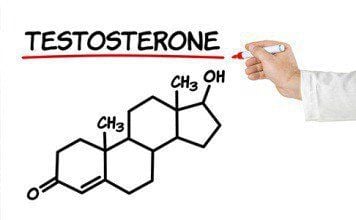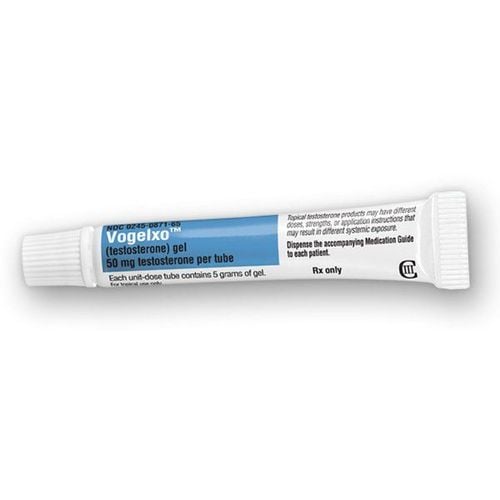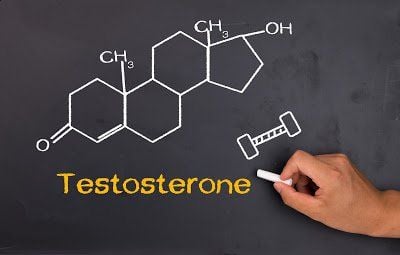This is an automatically translated article.
Testosterone is a male sex hormone, a decisive factor in the formation of male characteristics, bringing masculinity and strength to men. Besides, it also governs sexual activities and general health of men.1. The role of testosterone in men's health
Testosterone is one of the male sex hormones, produced mainly in the testes and to a small extent in the adrenal glands. Testosterone plays a very important role in men's health, including:Helps to form masculine body during the stage of sexual differentiation (infancy) Secondary sexual development and sexual function During puberty Promotes the development of sexual function after puberty Initiates and maintains spermatogenesis Plays an important role in male sexual performance and erection. Essential for the body's metabolic activities such as protein synthesis, liver function, production of blood cells in the bone marrow, bone formation, fat and sugar metabolism, and prostate enlargement.

Testosterone có vai trò quan trọng với sức khỏe nam giới
2. How does low testosterone affect men's health?
With age, the level of testosterone in the blood decreases gradually. This is part of the aging process, also known as menopause. For many men, the condition may not cause much harm or cause any serious symptoms. However, there are also many cases where their body begins to have obvious changes in health, including:
Decreased sex drive, decreased penile erection and sperm count. Nervous system impairment Loss of physical activity Changes in lifestyle, psychological and emotional habits Prefer to live in solitude Frequent aches and pains, general body fatigue Decrease in strength and muscle mass Increase in abdominal fat mass and upper body Back pain, osteoporosis High risk of cardiovascular diseases Hematopoietic system disorders Affects skin, hair, nails and coat. In addition, decreased testosterone levels also seriously affect quality of life and cause long-term, potential harms for men, especially the risk of diseases such as cardiovascular disease, osteoporosis, fat.

Suy giảm testosterone khiến nam giới mất tự tin
3. The link between low testosterone and diabetes
According to recent studies, men with diabetes are more likely to have low testosterone and conversely, men with low testosterone levels have a higher risk of developing diabetes later in life. Testosterone helps the body's tissues absorb more blood sugar in response to insulin. Men with low testosterone often experience insulin resistance: they need to produce more insulin to keep blood sugar levels normal.
In a randomized trial, it was shown that up to half of men with type 2 diabetes have low testosterone levels.
4. The link between low testosterone and obesity
Obesity and the decline in testosterone levels are closely related, causing men to fall into a "spiral" of weight gain and hormonal imbalance.
Fat cells convert testosterone into estrogen, which lowers testosterone levels. In addition, obesity lowers the level of sex hormone-binding globulin (SHBG), a protein that carries testosterone in the blood. Less SHBG means less free testosterone than normal.
To improve this condition, losing weight through regular exercise can increase testosterone levels in the body.

Béo phì là nguyên nhân gây giảm nồng độ testosterone
5. Metabolic syndrome and low testosterone
Metabolic syndrome is the name of a condition that includes the presence of abnormal cholesterol levels, high blood pressure, obesity in the waist, and high blood sugar. Metabolic syndrome increases the risk of heart attack and stroke.
Studies show that men with low testosterone are more likely to develop metabolic syndrome. In metabolic syndrome, adipose tissue is the endocrine organ that produces most of the hormones and cytokines, in which visceral fat has strong pressure on andogen receptors and fatty acids, so androgen receptors are accumulated in fat. . There is evidence that testosterone is an independent risk factor for obesity. Production of leptin from adipose tissue is strongly associated with insulin resistance and it plays a key role in hormone synthesis and in the reduction of plasma testosterone levels.
Testosterone replacement therapy may help improve blood sugar and obesity in men with low testosterone. However, testosterone therapy increases the risk of heart disease, so it is not used to treat metabolic syndrome.
6. Heart disease and low testosterone
Testosterone has a mixed effect on the arteries. Many experts say testosterone contributes to increased rates of heart disease and high blood pressure tends to affect men at a younger age. High testosterone levels can be bad for the heart. However, testosterone deficiency has been linked to insulin resistance, obesity, and diabetes. This can increase the risk of cardiovascular diseases. Men with diabetes and low testosterone also have higher than normal rates of atherosclerosis or hardening of the arteries.
A certain amount of testosterone is needed to keep the arteries healthy because it is converted into estrogen, which protects the arteries from damage. However, to date, there are no studies showing that testosterone replacement can protect the heart or prevent heart attacks.

Suy giảm nồng độ testosterone làm tăng tỷ lệ mắc các bệnh về tim mạch
7. Low testosterone and other health problems in men
Low testosterone often leads to the following health conditions:
Depression: In a study of nearly 4,000 men over the age of 70, those with the lowest testosterone levels were twice as likely to experience depression. Erectile dysfunction (ED): Erectile problems and decreased sex drive are common symptoms of low testosterone. While most of the conditions of erectile dysfunction in older men are caused by atherosclerosis.
8. Measures to help increase testosterone in men
An increase in testosterone in men facilitates muscle growth and helps improve reproductive health. Men should try to maintain a stable testosterone level, especially as they age. Here are some measures that can help you increase testosterone in the body:
Regular exercise: for the elderly, it is recommended to exercise daily to maintain testosterone levels, to keep the body full. although it has been reduced more or less by the ravages of time. Supplement adequate amounts of protein, fat and carbohydrates: a scientific diet helps increase testosterone levels for men, including enough protein to support fat loss and maintain a source of materials to nourish the body, load Adding good fats from fish oil, vegetable oil, flaxseed, sesame, etc. is very beneficial for testosterone and general health, enough carbohydrates help optimize testosterone levels during exercise. . Reduce stress and cortisol levels: Prolonged stress can increase the levels of the hormone cortisol in the body, leading to low testosterone. Vitamin D Supplement: This is a natural testosterone booster. Supplement full of minerals and vitamins: help increase hormones in men.
Please dial HOTLINE for more information or register for an appointment HERE. Download MyVinmec app to make appointments faster and to manage your bookings easily.
Reference source: Webmd.com












